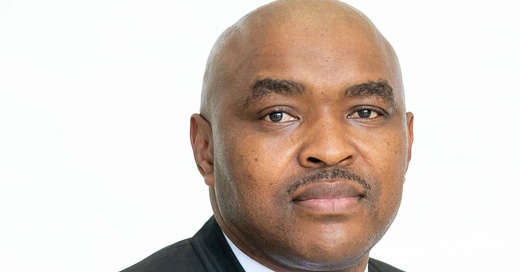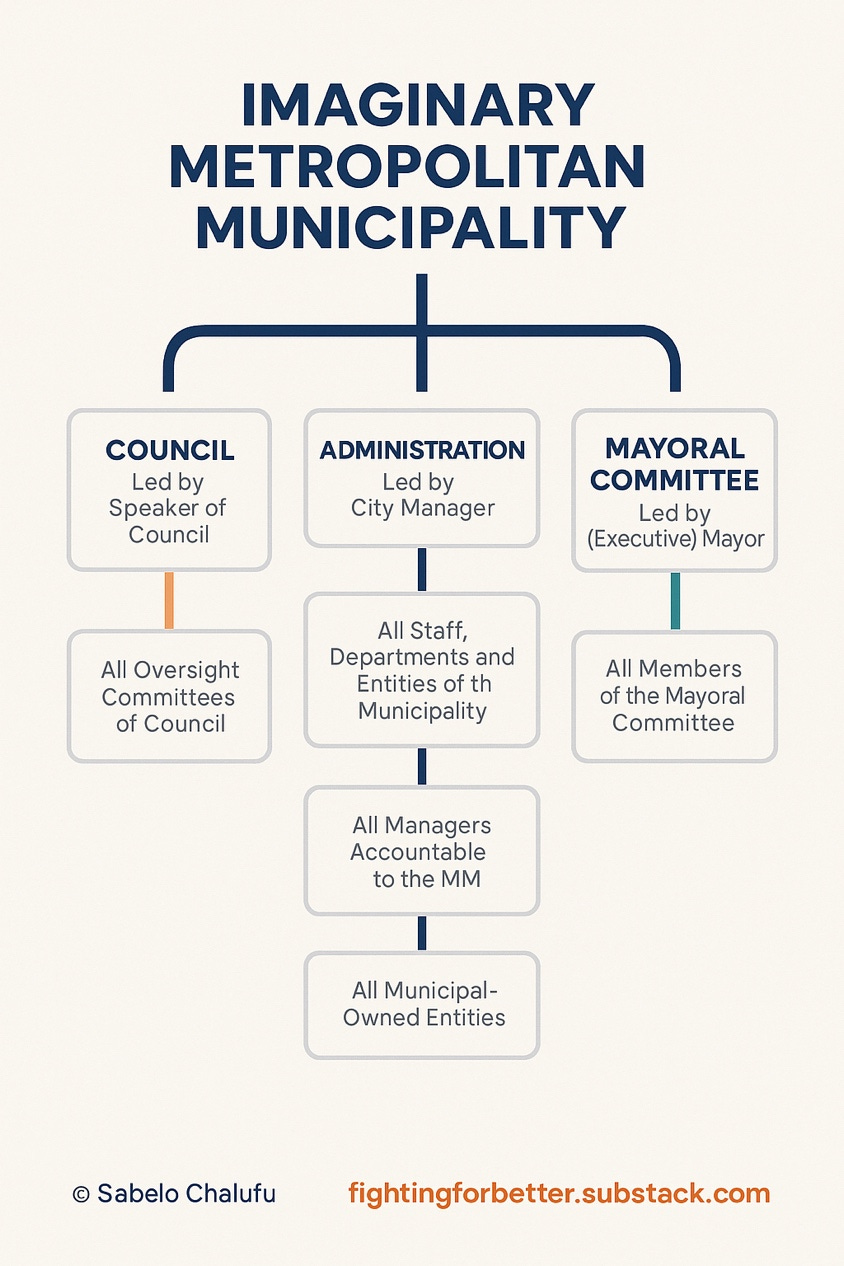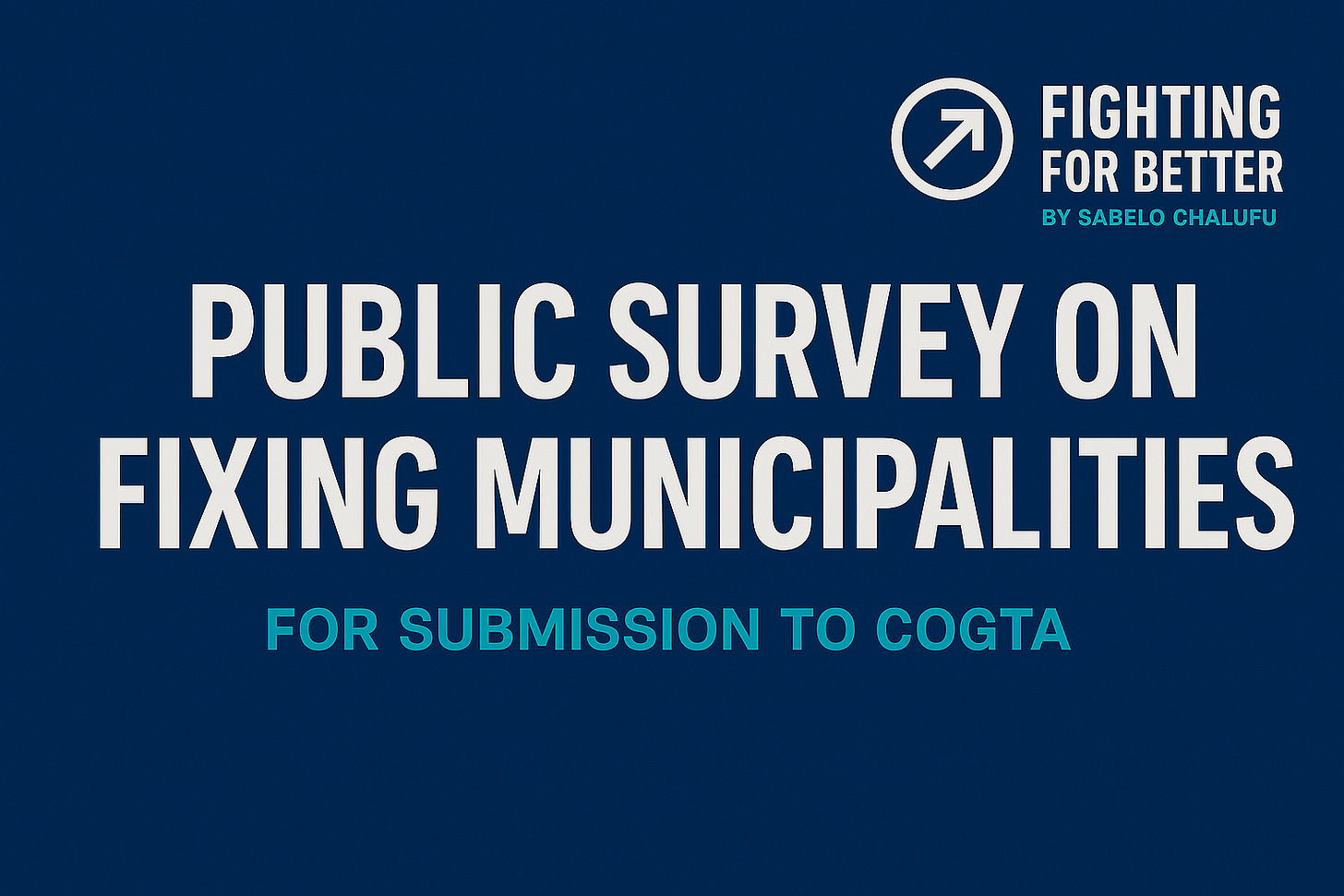Tshwane Speaker Survived MONC. Joburg’s Didn't.
A new one’s on the way. Perfect time to understand local power and help rewrite the rules.
Picture: Tshwane Speaker, Mncedi Ndzwanana.
Well then, the musical chairs playing itself out in the leadership of the Gauteng Metro Municipalities continues unabated. This time, it has spared the Administrative Capital of the Republic, but struck the Economic Capital off the continent.
On Wednesday, it continued in Johannesburg, with the removal of the (now Former) Speaker of Council, ActionSA’s Nobuhle Mthembu, through a Motion of No Confidence. Yesterday, north of the Jukskei, the Speaker of Council in the City of Tshwane, the African Transformation Movement’s Mncedi Ndzwanana, survived a similar attempt to oust him from his post.
Today, we discuss what a Speaker of Council does, why the role matters, and why over 80% of respondents to our Public Survey on Fixing Municipalities are calling for better credentials, qualifications and ethical standards in local leadership.
Let’s dig in.
The Chairperson
Part 2 of the Municipal Structures Act 117 of 1998 (“the Act”) fully details the role of the Speaker of Council. It provides, at section 36, as follows;
“ 36 Election of speakers
(1) Each municipal council must have a chairperson who will be called the speaker.
(2) At its first sitting after its election, or when necessary to fill a vacancy, a municipal council must elect its speaker from among the councillors.”
The next section then details the full scope of the Speaker’s role. It is helpful to post it in full;
“…The speaker of a municipal council -
(a) presides at meetings of the council;
(b) performs the duties and exercises the powers delegated to the speaker in terms of section 59 of the Municipal Systems Act;
(c) must ensure that the council meets at least quarterly;
(d) must maintain order during meetings;
(e) must ensure compliance in the council and council committees with the Code of Conduct set out in Schedule 1 to the Municipal Systems Act;
(f) must ensure that council meetings are conducted in accordance with the rules and orders of the council.”
To give you a sense of how the system is structured in practical terms, let us use a visual aid:
To bring it all together, then, a few things;
Once the Speaker and Mayor are elected, the Mayor then appoints a Committee of their own and assigns or delegates oversight responsibilities to each member. This is similar to how the National and Provincial Cabinets are constituted, with one caveat, KwaZulu-Natal. They are the only province whose municipalities use a different system for assigning responsibility to politicians reporting to the Mayor (they are elected, instead of appointed). This, too, is provided for in the Act, but we won’t discuss it today.
These Members of the Mayoral Committees then oversee service delivery departments in their portfolios. On a monthly basis, the Mayor and her Committee report to Council on the work of their portfolios and, where necessary, seek Council approval for various things.
Thus, when people in government speak about the legislature’s “oversight power over the executive”, they speak about this. It is the Speaker of Council who oversees it.
The Practical Effect In Gauteng Metros
Much of the above may be quite abstract to many of us, so it is helpful to demonstrate the structural and political power of the position using the case of the Gauteng Metros.
Three weeks after the 2021 Local Government Elections of 01 November, the Metros held their inaugural Council meetings. In Tshwane, the ATM’s Mncedi Ndzwanana was elected Speaker, the Democratic Alliance’s Vasco Da Gama was elected in Joburg, as was his party colleague, Raymond Dlamini, in Ekurhuleni.
Then, the initial 2021 coalitions, which included the DA, ActionSA, and Many More, started collapsing under the weight of internal and external pressures caused by some politicians feeling disrespected, others feeling that colleagues and their political parties were “stealing the limelight”, and other such very mature things. I have previously written about this at length. You can check out this edition about when Joburg had Two Mayors, as a start.
Between August and September of 2022, the first major crack emerged in the Joburg coalition.
The Chairperson of the Committee of Chairpersons, then COPE’s lone Councillor, Ms Colleen Makhubele (yes, the same one who is now Chief Whip of the Mkhonto WeSizwe Party in Parliament), launched a coup against the Speaker of Council. It is alleged that she was unhappy with their relationship and often felt sidelined by the Speaker.
In Joburg, there is no Deputy Speaker of Council. However, Council meetings can be chaired by the Chair of Chairs when the Speaker is temporarily away, say they need to take a comfort break. Council meetings can be very long and are often held over two days. This means the relationship between the two Office Bearers needs to be harmonious. This one had clearly broken.
Makhubele then switched sides and left the coalition of the DA, ActionSA and Many More to join the other side led by the ANC, EFF and Many More. They called a Motion of No Confidence against the DA’s Speaker. It was held, and it succeeded.
Makhubele was elected as Speaker soon thereafter, and her first order of business was to preside over a haphazardly arranged Motion of No Confidence against the Mayor, Dr Mpho Phalatse. It, too, succeeded, though it was on dubious legal grounds.
The DA challenged Phalatse’s ouster in court, and, indeed, it was overturned by the court exactly 25 days later. But the damage was done. There was political blood on the floor, and the hyenas were circling the coalitions.
So, in October 2022, the DA’s Speaker and Mayor in Ekurhuleni were removed, and the same ANC-EFF coalition took over. Having lost its Speaker in 2022, the DA-ActionSA coalition in Joburg was on borrowed time, and it finally collapsed in January 2023.
To be clear, I don’t pin the collapses on the loss of the Speakers. I’ve already explained what caused the breakdowns above.
However, the loss of the Speakership was mission-critical. It helped put the final nail in the coalition coffins, and this is for one very simple reason: the Speaker has enormous power insofar as whether or not a Motion of No Confidence in a Mayor is held.
They influence whether or not it is held and when. Further, they (alone) get to decide if it is held by secret ballot or openly. Both of these are key levers in any attempt to topple an administration.
If the Speaker is on the side of the Mayor (and their executive), or simply not opposed to the Mayor, they can frustrate the opposition to almost no end. If not, the Mayor is on borrowed time.
This is a fine line that the ATM’s Ndzwanana, in Tshwane, has walked with quite some skill. He was never part of the DA-ActionSA coalition, yet he won the election for Speaker when that coalition could not get its house in order and elect one of their own. Thereafter, he has batted away MONC’s against himself and successfully defended himself in court. Today, even ActionSA defends his Speakership.
Oh, yes, in case you have been sleeping. ActionSA adopted a new approach last year, moving away from its previous difficult partnership with the DA. The effect of this seismic shift was that in Tshwane, their Dr Nasiphi Moya became Executive Mayor, in Joburg, their Nobuhle Mthembu became Speaker. In Ekurhuleni, at least one of the party’s Councillors has taken up a position as the Chairperson of an oversight Committee.
And so, it seems, in all the leadership upheaval, one man has outlasted all senior leaders in the Gauteng Metros, one Mr Mncedi Ndzwanana of Tshwane. He is the only Office Bearer amongst all Speakers and Mayors who has held on to his post since his 2021 election. He has survived attempts to remove him by Motions of No Confidence and even an ActionSA-sponsored High Court Application.
At this point, that is quite the feat. If things keep going the way they have, it is unreasonable to conclude that he may just last the full term.
So, What Next?
Well, in Tshwane, nothing. Life goes on, for now. The Speaker is going nowhere. Joburg is a different case. There must be an election held for a new Speaker.
In terms of the Act, the (Acting) City Manager must set the date for this election and, in terms of Joburg’s Council Rules, this election must be held within fourteen days of the Wednesday removal. Further, the ACM must preside over that election. If they are not available, another person designated by the MEC for local government in the province must do so.
Hang ten, Johannesburg. You will not be without a Speaker for long.
The Calibre of Leadership
It is anyone’s guess as to who the next Speaker of Joburg might be. However, there are rumours going around about certain candidates. These include a potential changing of the deck chairs, with two of the current MMCs said to be lobbying to switch over, or a return of one of the recent Former Mayors.
Time will tell, but at least it won’t be long. It’s only a matter of two weeks, compatriots.
What I can tell you, though, is that an overwhelming majority of respondents to the survey we’re running on Fixing Municipalities say they believe that in order to do so, we need a mix of stricter requirements for candidates, tighter regulation of political parties and a minimum threshold for holding public office.
I am inclined to agree, in parts, but I will reserve my full opinion for after the survey. For now, accept that I partially agree.
In their further comments, participants explain that these would raise the bar for leadership, which would, naturally, raise the standards for how our municipalities work, the service we get from them, and the consequent increase in the quality of our everyday lives. On this, I agree wholeheartedly.
If you have taken the survey, our journey can end after you have seen the charts speaking to these issues below. The rest will be repetition to you. Thank you for your contributions. I love you.
If you haven’t yet, let me try to persuade you to do so. Observe;
When asked if there should be stricter requirements for councillor candidates, 81% of participants say yes.
When asked if additional regulation of the behaviour of political parties could contribute to improving governance, 71.4% of respondents say yes.
When asked if, in order to stabilise municipalities, there should be a threshold for representation, 64,3% say yes.
NB: There was an error in the design of the answer mechanism on this question. In that, the question was styled as “Choose One Only”, but the selection feature available for users permitted multiple options to be selected. Some participants clearly did select more than one, as the total selected option exceeded the participant count at the time of finalising this edition. Nevertheless, even if you add all the options other than “yes”, they are still a minority, with the “yes” selections still clearly dominating.
The Survey and the Review of the 1998 White Paper on Local Government
You and I have, effectively, only two more days to make a generational contribution that can change the future of our municipalities. How, you may ask? Government is in the process of reviewing the 1998 White Paper on Local government. We have a chance, until Monday, to contribute to that process and tell them what matters most to us in our municipalities, what solutions we propose and what changes we would like to see.
The Survey we are running is part of enabling that. It seeks to make it easy for residents to speak directly to our government about what matters to us, in our own names. It is to help us play our part in building better municipalities.
If you haven’t heard, Government, through the Department of Cooperative Governance and Traditional Affairs (“COGTA”), is trying to fix our municipalities. They are doing so by reviewing the White Paper on Local Government. Simply put, this is a government policy instrument that provides the overarching framework through which a sector or issue is to be addressed.
Once developed, it becomes the instrument with which legislation, policy or regulation must align to enable the government of the day to achieve its strategic objectives.
When I say this is a chance to make a “generational change”, I do not hyperbolise. This is the first time government is doing this since 1998, when it passed the outgoing White Paper. Thus, when this process is done, the new White Paper will likely be in place for a generation.
As part of the legislated process, they have invited our input as the public into the development of the new White Paper. Thus, the Survey we are running is part of enabling that. It seeks to make it easy for residents to speak directly to our government about what matters to us, in our own names. It is to help us play our part in building better municipalities.
Last Saturday’s edition of the newsletter goes into more detail, and you’re free to read it at your leisure here.
Housekeeping:
In guiding our participation, COGTA asks us to answer 21 questions across three sections. They span nine interconnected priority areas that the Department has identified. Thus, to make it easier for fellow citizens and residents, to play their part, I’ve structured the survey as follows;
I’ve lifted all the questions directly from COGTA and proposed multiple-choice options for participants to consider.
Participants can select any or all of the solutions they agree with, and the majority of questions include several answer options, though five are single-choice only.
The aforesaid notwithstanding, all questions include a further comment option in case participants want to add anything that is not covered by the options, or to simply explain their rationale.
What Is Left To Be Done?
If you’re still reading, I am assuming that you are seriously considering taking the Survey. If you’re not, stick around anyway. Maybe I’ll change your mind.
On top of everything I mentioned in the previous section, note that you’ll need to devote between 5 and 10 minutes to complete the survey. However, if you’re adding your own comments, you will likely spend 10-20 minutes more.
Once done, you will input the biographical details that you are comfortable sharing (so that COGTA can tell you are a real person) and click submit. Your responses will be delivered instantly to me, and I will package these and send them to COGTA in time to meet their deadline.
If you do participate or even if you don’t but you know others who might be keen to, please share the survey with them, or as many others as you know. Let’s work together to create the change we want to live in. The more inputs we can get, the weightier our collective contributions and the harder we are to ignore.
COGTA’s deadline for public comments is next Monday, 30 June 2025. However, we have a self-imposed deadline of Sunday, 29 June 2025. This is so that I have sufficient time to properly collate all inputs received and make the submission on behalf of everybody who participated in time.
A big word of gratitude goes to everybody who has taken the time to participate in the survey so far, including by sharing it with others so they can participate. Thank you for affirming my conviction that “ordinary” South Africans want to participate in public processes; they are simply dissuaded from doing so by poor communication and cumbersome systems. This is an invaluable affirmation which I will forever cherish.
Those who want to read COGTA’s 69-page Discussion Document can find it here.
To register* your interest and/ or complete our updated Public Survey on Fixing Municipalities, click here.
Alternatively, copy and paste the following link in your web browser: https://forms.gle/iB755X6MbYEcHxBa9
Alright, that’s it for today. Be back soon and, if no one else has told you, I love you.
SC
This post has been updated to reflect that the Phalatse Administration fell in January 2023, not February as was originally stated.
*This post has been updated to reflect that there is an updated survey.
If you’re enjoying this content, you’re likely finding it valuable, and it meets your desires. If you’re already subscribed, thank you so much. If not, please subscribe and share in your community. Let’s build the country of our best dreams, together. And if you’ve ever shared with a loved one, bless you.
If you care about public leadership, good governance and enforcing accountability, and you have relevant insights, expertise, or just something to say, then write with us. Send submissions to: fightingforbetterza@gmail.com with subject: “Guest Edition” and your headline.
All voices will be considered, but final editorial discretion applies.









